Genre
Genre , "kind" or "sort", from Latin genus , is any form or type of communication in any mode (written, spoken, digital, artistic, etc.) with socially-agreed upon conventions developed over time. Genre is most popularly known as a category of literature, music, or other forms of art or entertainment, whether written or spoken, audio or visual, based on some set of stylistic criteria, yet genres can be aesthetic, rhetorical, communicative, or functional. Genres form by conventions that change over time as new genres are invented and the use of old ones is discontinued. Often, works fit into multiple genres by way of borrowing and recombining these conventions. Stand alone texts, works, or pieces of communication may have individual styles, but genres are amalgams of these texts based on agreed upon or socially inferred conventions. Some genres may be rigid with strictly adhered to guidelines while others may be very flexible.Plot(narrative)
Plot refers to the sequence of events inside a story which affect other events through the principle of cause and effect. The causal events of a plot can be thought of as a series of sentences linked by "and so". Plots can vary from simple structures such as in a traditional ballad to complex interwoven structures sometimes referred to as an imbroglio. The term plot can serve as a verb and refer to a character planning future actions in the story.

History
History (from Greek ἱστορία, historia, meaning "inquiry, knowledge acquired by investigation") is the study of the past as it is described in written documents. Events occurring before written record are considered prehistory. It is an umbrella term that relates to past events as well as the memory, discovery, collection, organization, presentation, and interpretation of information about these events. Scholars who write about history are called historians.Poetics(Aristotle)
Aristotle's Poetics (Greek: Περὶ ποιητικῆς, Latin: De Poetica; c. 335 BCE) is the earliest surviving work of dramatic theory and first extant philosophical treatise to focus on literary theory in the West. This has been the traditional view for centuries. However, recent work is now challenging whether Aristotle focuses on literary theory per se (given that not one poem exists in the treatise) or whether he focuses instead on dramatic musical theory that only has language as one of the elements.The Five Part of Plot
The five parts of a plot are:
1. exposition
2. rising action
3. climax
4. falling action
5. Resolution

website: https://www.enotes.com/homework-help/list-define-five-parts-plot-please-help-88197http://penandthepad.com/five-elements-plot-conflict-4472.html
Iliad
The Iliad in Classical Attic; sometimes referred to as the Song of Ilion or Song of Ilium) is an ancient Greek epic poem in dactylic hexameter, traditionally attributed to Homer. Set during the Trojan War, the ten-year siege of the city of Troy (Ilium) by a coalition of Greek states, it tells of the battles and events during the weeks of a quarrel between King Agamemnon and the warrior Achilles.Homer
Homer (Ancient Greek: Ὅμηρος [hómɛːros], Hómēros) is the name ascribed by the ancient Greeks to the semi-legendary author of the Iliad and the Odyssey, two epic poems which are the central works of Greek literature. The Iliad is set during the Trojan War, the ten-year siege of the city of Troy by a coalition of Greek states, but focuses on a quarrel between King Agamemnon and the warrior Achilles lasting a few weeks during the last year of the war. The Odyssey focuses on the journey home of Odysseus, king of Ithaca, after the fall of Troy.
In medias res
A narrative work beginning in medias res (Classical Latin: [ɪn mɛdiaːs reːs], lit. "into the middle things") opens in the midst of action (cf. ab ovo, ab initio). Often, exposition is bypassed and filled in gradually, either through dialogue, flashbacks or description of past events. For example, Hamlet begins after the death of Hamlet's father. Characters make reference to King Hamlet's death without the plot's first establishment of said fact. Since the play focuses on Hamlet and the revenge itself more so than the motivation, Shakespeare utilizes in medias res to bypass superfluous exposition.Chronology
Chronology (from Latin chronologia, from Ancient Greek χρόνος, chrónos, "time"; and -λογία, -logia) is the science of arranging events in their order of occurrence in time. Consider, for example, the use of a timeline or sequence of events. It is also "the determination of the actual temporal sequence of past events".
Chronology is part of periodization. It is also part of the discipline of history, including earth history, the earth sciences, and study of the geologic time scale.

Plague(disease)
Plague is an infectious disease that is caused by the bacterium Yersinia pestis. Depending on lung infection, or sanitary conditions, plague can be spread in the air, by direct contact, or very rarely by contaminated undercooked food. The symptoms of plague depend on the concentrated areas of infection in each person: bubonic plague in lymph nodes, septicemic plague in blood vessels, pneumonic plague in lungs. It is treatable if detected early. Plague is still relatively common in some remote parts of the world.
SARS(Severe acute respiratory syndrome)
Severe acute respiratory syndrome (SARS) is a viral respiratory disease of zoonotic origin caused by the SARS coronavirus (SARS-CoV). Between November 2002 and July 2003, an outbreak of SARS in southern China caused an eventual 8,098 cases, resulting in 774 deaths reported in 37 countries, with the majority of cases in Hong Kong (9.6% fatality rate) according to the World Health Organization (WHO). No cases of SARS have been reported worldwide since 2004.

Achilles
In Greek mythology, Achilles (/əˈkɪliz/, uh-kill-eez; Greek: Ἀχιλλεύς) was a Greek hero of the Trojan War and the central character and greatest warrior of Homer's Iliad. His mother was the immortal nymph Thetis, and his father, the mortal Peleus, was the king of the Myrmidons.
Achilles’ most notable feat during the Trojan War was the slaying of the Trojan hero Hector outside the gates of Troy. Although the death of Achilles is not presented in the Iliad, other sources concur that he was killed near the end of the Trojan War by Paris, who shot him in the heel with an arrow. Later legends (beginning with a poem by Statius in the 1st century AD) state that Achilles was invulnerable in all of his body except for his heel. Alluding to these legends, the term "Achilles heel" has come to mean a point of weakness, especially in someone or something with a strong constitution.

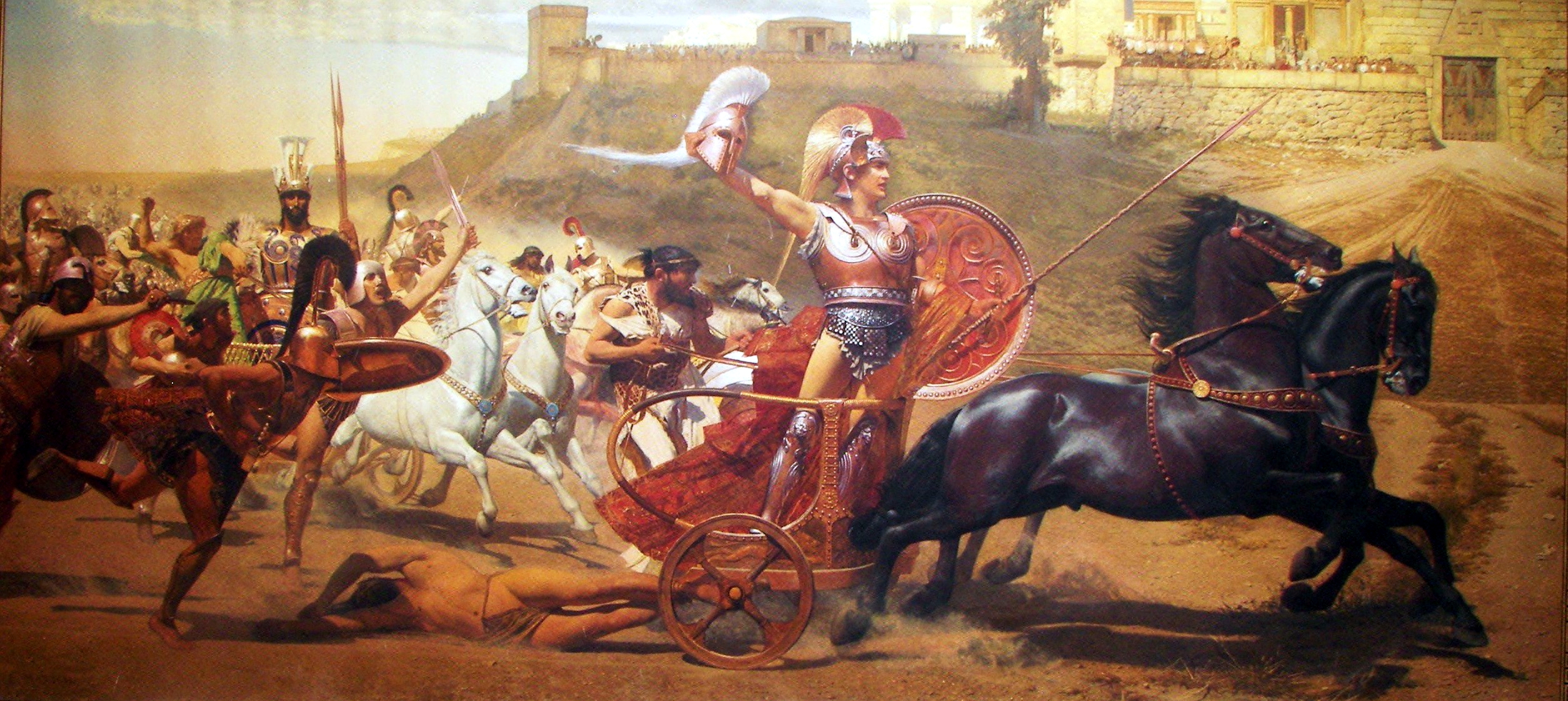
Agamemnon
In Greek mythology, Agamemnon (/æɡəˈmɛmnɒn/; Greek: Ἀγαμέμνων from *Ἀγαμέδμων [from ἄγαν, "very much" and μέδομαι, "think on"], "very steadfast", "unbowed") was the son of King Atreus and Queen Aerope of Mycenae, the brother of Menelaus, the husband of Clytemnestra and the father of Iphigenia, Electra or Laodike (Λαοδίκη), Orestes and Chrysothemis. Mythical legends make him the king of Mycenae or Argos, thought to be different names for the same area. When Helen, the wife of Menelaus, was taken to Troy by Paris, Agamemnon commanded the united Greek armed forces in the ensuing Trojan War.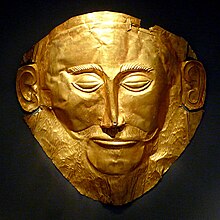
Respiratory system
The respiratory system (called also respiratory apparatus, ventilatory system) is a biological system consisting of specific organs and structures used for the process of respiration in an organism. The respiratory system is involved in the intake and exchange of oxygen and carbon dioxide between an organism and the environment.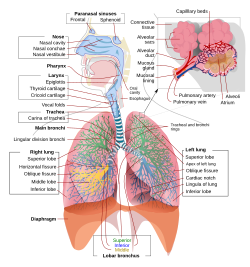
FBI(Federal Bureau of Investigation)
The Federal Bureau of Investigation (FBI) is the domestic intelligence and security service of the United States, which simultaneously serves as the nation's prime federal law enforcement agency. Operating under the jurisdiction of the U.S. Department of Justice, the FBI is concurrently a member of the U.S. Intelligence Community and reports to both the Attorney General and the Director of National Intelligence. A leading U.S. counterterrorism, counterintelligence, and criminal investigative organization, the FBI has jurisdiction over violations of more than 200 categories of federal crimes.


Epic poetry
An epic poem, is a lengthy narrative poem, ordinarily concerning a serious subject containing details of heroic deeds and events significant to a culture or nation. Milman Parry and Albert Lord have argued that the Homeric epics, the earliest works of Western literature, were fundamentally an oral poetic form. These works form the basis of the epic genre in Western literature. Nearly all Western epic (including Virgil's Aeneid and Dante's Divine Comedy) self-consciously presents itself as a continuation of the tradition begun by these poems. Classical epic employs dactylic hexameter and recounts a journey, either physical (as typified by Odysseus in the Odyssey) or mental (as typified by Achilles in the Iliad) or both. Epics also tend to highlight cultural norms and to define or call into question cultural values, particularly as they pertain to heroism.

Lyrics poetry
Lyric poetry is a formal type of poetry which expresses personal emotions or feelings, typically spoken in the first person.The term derives from a form of Ancient Greek literature, the lyric, which was defined by its musical accompaniment, usually on a stringed instrument known as a lyre. The term owes its importance in literary theory to the division developed by Aristotle between three broad categories of poetry: lyrical, dramatic and epic.

Lyre
The lyre (Greek: λύρα, lýra) is a string instrument known for its use in Greek classical antiquity and later periods. The lyre is similar in appearance to a small harp but with distinct differences. The word comes via Latin from the Greek; the earliest reference to the word is the Mycenaean Greek ru-ra-ta-e, meaning "lyrists" and written in the Linear B script. The lyres of Ur, excavated in ancient Mesopotamia (modern Iraq), date to 2500 BC. The earliest picture of a lyre with seven strings appears in the famous sarcophagus of Hagia Triada (a Minoan settlement in Crete). The sarcophagus was used during the Mycenaean occupation of Crete (1400 BC). The recitations of the Ancient Greeks were accompanied by lyre playing.

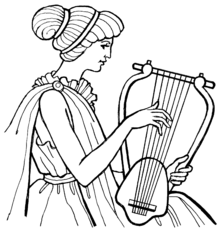
Apollo
Apollo is one of the most important and complex of the Olympian deities in classical Greek and Roman religion and Greek and Roman mythology. The ideal of the kouros (a beardless, athletic youth), Apollo has been variously recognized as a god of music, truth and prophecy, healing, the sun and light, plague, poetry, and more. Apollo is the son of Zeus and Leto, and has a twin sister, the chaste huntress Artemis. Apollo is known in Greek-influenced Etruscan mythology as Apulu.
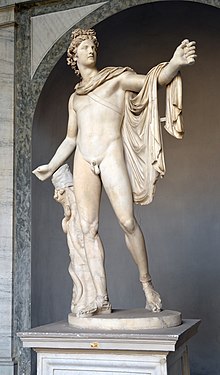
National and Kapodistrian University of Athens
The National and Kapodistrian University of Athens usually referred to simply as the University of Athens (UoA), is a public university in Athens, Greece. It has been in continuous operation since its establishment in 1837 and is the oldest higher education institution of the modern Greek state and the first contemporary university in the Eastern Mediterranean. Today it is the biggest university in Europe, with more than 104,000 registered students, according to the 2014 university data sheet. In 2012 it was ranked in the positions 501–550 among the best universities in the world, according to the index of QS World University Rankings, as well as according to the evaluation of Academic Ranking of World Universities (ARWU).Pan(god)
In Greek religion and mythology, Pan (/ˈpæn/; Ancient Greek: Πάν, Pan) is the god of the wild, shepherds and flocks, nature of mountain wilds and rustic music, and companion of the nymphs. His name originates within the ancient Greek language, from the word paein (πάειν),[citation needed] meaning "to pasture"; the modern word "panic" is derived from the name. He has the hindquarters, legs, and horns of a goat, in the same manner as a faun or satyr. With his homeland in rustic Arcadia, he is also recognized as the god of fields, groves, and wooded glens; because of this, Pan is connected to fertility and the season of spring. The ancient Greeks also considered Pan to be the god of theatrical criticism and impromptus.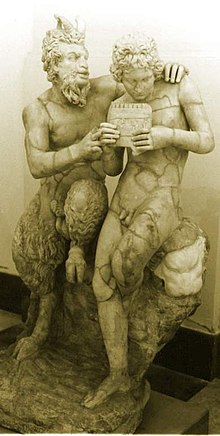
Sonnet
A sonnet is a poem in a specific form which originated in Italy; Giacomo da Lentini is credited with its invention.
The term sonnet is derived from the Italian word sonetto (from Old Provençal sonet a little poem, from son song, from Latin sonus a sound). By the thirteenth century it signified a poem of fourteen lines that follows a strict rhyme scheme and specific structure. Conventions associated with the sonnet have evolved over its history. Writers of sonnets are sometimes called "sonneteers", although the term can be used derisively.

John Milton
John Milton (9 December 1608 – 8 November 1674) was an English poet, polemicist, man of letters, and civil servant for the Commonwealth of England under Oliver Cromwell. He wrote at a time of religious flux and political upheaval, and is best known for his epic poem Paradise Lost (1667), written in blank verse.
Rhyme scheme
A rhyme scheme is the pattern of rhymes at the end of each line of a poem or song. It is usually referred to by using letters to indicate which lines rhyme; lines designated with the same letter all rhyme with each other.
An example of the "abab" rhyming scheme, from To Anthea, who may Command him Anything, written by Robert Herrick:
|
|
Shall i compare thee to a summer's day
Shall I compare thee to a summer’s day?
Thou art more lovely and more temperate.
Rough winds do shake the darling buds of May,
And summer’s lease hath all too short a date.
Sometime too hot the eye of heaven shines,
And often is his gold complexion dimmed;
And every fair from fair sometime declines,
By chance, or nature’s changing course, untrimmed;
But thy eternal summer shall not fade,
Nor lose possession of that fair thou ow’st,
Nor shall death brag thou wand’rest in his shade,
When in eternal lines to Time thou grow’st.
So long as men can breathe, or eyes can see,
So long lives this, and this gives life to thee.
Sonnet 18, often alternatively titled Shall I compare thee to a summer's day?, is one of the best-known of 154 sonnets written by the English playwright and poet William Shakespeare. Part of the Fair Youth sequence (which comprises sonnets 1–126 in the accepted numbering stemming from the first edition in 1609), it is the first of the cycle after the opening sequence now described as the procreation sonnets.

William Shakespeare
William Shakespeare (/ˈʃeɪkspɪər/; 26 April 1564 (baptised) – 23 April 1616) was an English poet, playwright, and actor, widely regarded as the greatest writer in the English language and the world's pre-eminent dramatist. He is often called England's national poet, and the "Bard of Avon". His extant works, including collaborations, consist of approximately 38 plays, 154 sonnets, two long narrative poems, and a few other verses, some of uncertain authorship. His plays have been translated into every major living language and are performed more often than those of any other playwright.
沒有留言:
張貼留言